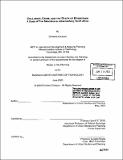Collusion, crime, and the death of downtown : a study of firm relocation in Johannesburg, South Africa
Author(s)
Erickson, Christina, 1977-
DownloadFull printable version (15.39Mb)
Other Contributors
Massachusetts Institute of Technology. Dept. of Urban Studies and Planning.
Advisor
Diane E. Davis.
Terms of use
Metadata
Show full item recordAbstract
This study explores the dynamics of firm relocation in Johannesburg, South Africa, by analyzing the mass exodus of firms out of the city's Central Business District (CBD) over the past two decades. Using a historical approach, this study examines the interplay between urban form and firm behavior. We typically understand urban form to be a function of firm behavior-that is, firms choose their locations and thus dictate which areas are developed. This study finds that the inverse is true. Firm behavior is a function of urban form. Firms are location-takers. Forces endogenous to the urban form act on firms to determine which areas of a city are favorable for firm location. The following chapters probe the way changes in the Johannesburg CBD's form, itself a function of political, economic, and social transition, push individual firms to disperse to new locales throughout the city. Exogenous factors like crime, state failure, and skewed property markets biased firms against the CBD as a viable location. Their predominance in the range of factors that affect firm behavior suggests that a focus on extra-firm institutions (rather than the firms themselves) more adequately explains the relationship between firm behavior and urban forms.
Description
Thesis (M.C.P. in International Development and Regional Planning)--Massachusetts Institute of Technology, Dept. of Urban Studies and Planning, 2003. Includes bibliographical references (leaves 125-130).
Date issued
2003Department
Massachusetts Institute of Technology. Department of Urban Studies and PlanningPublisher
Massachusetts Institute of Technology
Keywords
Urban Studies and Planning.